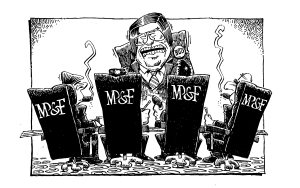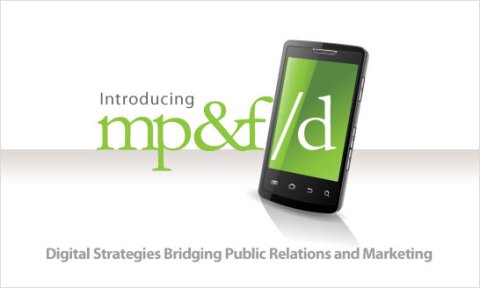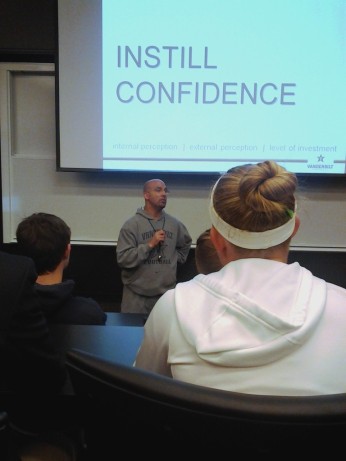The Story of Bud Adams and MP&F
October 22, 2013
Our company’s long-lasting relationship with Bud Adams and the Tennessee Oilers/Titans started quietly with a couple of phone calls and then a hastily called meeting in a Memphis hotel room before an Oilers game in Memphis against the Washington Redskins in 1997.
My partners Mark McNeely and Dave Cooley were at the meeting at the Memphis Hilton, and Mr. Adams, who died on Monday at age 90, made the decision that day to hire a public relations firm for the first time in his nearly 50 years as a professional football team owner.
His predicament at the time was simple: The decision had been made for his team to leave Houston after the 1996 season and play in Memphis for two seasons while Nashville built the team a new permanent stadium. McNeely Pigott & Fox had overseen the successful referendum campaign for approval of the Nashville stadium’s bonds, so we were familiar both with the project and with many of the members of the Oilers executive team.
The problem with having Memphis serve as the team’s temporary home was that the people there had wanted an NFL team of their own rather than to serve as babysitter for Nashville’s team. The result was that Mr. Adams was reviled by many in Houston for taking the team away, unwanted in Memphis because he wasn’t moving there permanently, and distrusted by some in Nashville after a hotly contested stadium debate.
I became involved in many of the steps after our hiring, and we have proudly worked with the team ever since. The immediate steps after that Memphis meeting were our helping with announcing that the team would arrive in Nashville a year earlier than originally planned, assisting with drawing a good crowd to their first game at their new temporary home at Vanderbilt stadium, and helping to get Mr. Adams in front of as many people as possible in Nashville to let them get to know him.
We oversaw the polling and analysis that led to Mr. Adams’ reluctant decision to change the name from Oilers to Titans, and we worked on many other projects with his quality senior staff.
Though a demanding boss sometimes, Mr. Adams could also be a real charmer and was great at telling stories from his many decades in professional football. His team has played to a sellout crowd at every game since LP Field opened.
He was controversial at times, but his record speaks for itself: Nashville is a far greater city overall because former Mayor Phil Bredesen and Bud Adams worked out a way to bring an NFL team here. I would contend he never put making money ahead of trying to make his team better. And his team has been generous in helping our city’s charitable organizations.
MP&F is proud to have “played for” Bud Adams.
Thank you. Gracias. Merci. Danke.
July 10, 2013
When I was a kid, my mom had a rule about thank-you notes. Any gift my brother and I received had to be acknowledged with a hand-written note to the giver within a week. If that task went undone, we lost the privilege of
using the gift until the note was written.
This rule has stuck with me, and I now keep a stash of notes handy, both for myself and for my children.
Thank-you notes should always be sent for life-event gifts – graduation, a wedding, a baby, to acknowledge condolences, etc. But they are equally important in the business world. I was reminded of the importance of hand-written correspondence by two excellent blog posts on the subject, one by fellow PRSA Counselors Academy member Eric Morgenstern and the other by MP&F friend Cindy Wall.
Here are some business occasions that I think require a hand-written note:

- After a job interview – This is a must. Don’t get lazy and send an email instead.
- Following a meeting with a prospective client – “Thank you for taking the time to meet with me last week. I look forward to discussing the needs of your company in more detail in the weeks to come.”
- A networking meeting – “Thanks for meeting me for coffee. I enjoyed hearing about your plans for the cupcake/wine bar. Hope to see you again soon.”
- After attending a conference where a meaningful connection was made – “It was a pleasure talking with you at the Counselors Academy meeting. Please call me if I can be of assistance as you transition to your new billing system.”
- To your mentor – “Thanks for meeting with me last week. I value your guidance and advice, and I look forward to our next meeting. Coffee is on me next month.”
Your note doesn’t have to be a novel. Keep it short. Use clean, simple stationery (Target has a great selection that won’t break the bank) or your company’s notecards. Think of this as a good chance to practice your handwriting. While technology and digital communications are a boon for our industry and make it easier than ever to tweet, pin and more, going back to the basics may make more of an impression.
MP&F has received many awards and honors over the past 26 years, and we are proud of all of them. We’re especially proud of our most recent honor – being named one of The Tennessean’s “Top Workplaces” as voted on by our employees – because it means we are succeeding in maintaining one of our core values.
 Early on, the firm’s partners committed to creating the kind of workplace for their employees that each of them would want to work in – a place that rewarded creativity and perseverance, that balanced hard work with fun, that treated everyone as family.
Early on, the firm’s partners committed to creating the kind of workplace for their employees that each of them would want to work in – a place that rewarded creativity and perseverance, that balanced hard work with fun, that treated everyone as family.
We believe strongly that maintaining that kind of work environment translates directly into producing the best work possible for our clients, and that’s what our business is all about. That’s what determines our success.
Here’s a sampling of what MP&F staff members say about working here:
Senior Account Executive
MP&F is a great place to work for hundreds of reasons – the great partners that lead the firm, the incredibly talented staff we have, our long list of diverse and wonderful clients; but my favorite thing about working at MP&F (and what has kept me here for nine years) is the team-oriented culture we have. Our “all-for-one and one-for-all” dedication to the firm, each other and our clients is irreplaceable. We work damn hard, we work together, and we have a lot of fun doing it.
Account Supervisor
A lot of companies pay lip service to being family-friendly; but here at MP&F, it is ingrained in the company culture. It’s not just that the partners have family-friendly policies – it’s that they truly care about people and understand that giving employees the flexibility to take care of their families is an asset, not a liability, for the company. For me personally, their willingness to allow me to work around family commitments makes me want to work that much harder for them. It makes me extremely dedicated and loyal to this firm, and it makes me feel appreciated as a person, not just as an employee.
Administrative Assistant
I first walked into this office 20 years ago as a summer college intern. Since then I have been involved in amazingly important and meaningful work in Nashville and around the world, while surrounded by the smartest and most creative people in town. Over the years, my bosses became my friends and my friends have become my bosses. I feel very fortunate to have bosses and co-workers who truly care about my family and me, not to mention they are just fun to be around every day.
In short, we work hard and play hard around here. We take our work very seriously, but try not to take ourselves too seriously. We get the job done and have a good time while doing it. Did someone say “beer cart”?
Editorial Director
There are so many things that make MP&F a great place to work, but a big one is the formal and informal benefits – they are tremendous. MP&F pays 100 percent of individual employee insurance, 100 percent of parking and offers a generous vacation package. Beyond that, the partners often give additional paid days off around Christmas. And this year, with July 4 on Thursday, they announced we would all get Friday off as well. Some of our younger staff may take those added benefits for granted; but as someone who knows this is not the norm, I sure don’t.
Staff Associate
When I interviewed with MP&F three months ago, I constantly heard about its “open-door policy.” I didn’t really know what that meant until I was able to experience it firsthand. From day one I have felt welcome to go to any staff member, from a fellow SA all the way to a partner, with any question I could possibly have. I feel challenged, supported and motivated on a daily basis. I am constantly learning something new or being exposed to a different scope of this crazy industry we call public relations. Nothing beats the feeling of knowing that your supervisors want you to do well, not only for the company’s success, but because they genuinely want you to succeed individually as well.
Account Executive
It’s hard to put into words what makes MP&F so special. To me, MP&F is a really great team that’s a lot like a family. I’ve always believed that when the MP&F team works together we can accomplish anything for our clients. That feeling of family and team comes from working with and for people who always are willing to jump in and help, whether it’s with planning a client event or developing a new idea. It’s a special place, and I feel really fortunate to be a small part of it.
Senior Account Executive
MP&F is not the best place to work for everyone. I don’t get to wear jeans every day, I don’t have a business card with a made-up title on it, and there’s only free beer in the break room, like, once a month. But, from the day I was hired I was encouraged to have ideas, share them and put them into action. My colleagues and I work in an environment where staff members at all levels – from interns to partners – are empowered to have a hand on the agency’s steering wheel. We like coming to work every day because we made this office the way it is.
Associate Account Executive
MP&F is one of the best places to work because I work with some of the most talented, smartest and hardworking people I’ve ever met. When I step off the elevator each morning, I know that the day ahead will include a lot of work, but I’m comforted in knowing that I’m a part of a great team. MP&F is my first “real job” since graduating from college, but I wouldn’t want to start my public relations career anywhere else because I’ve grown a lot and I’m learning more and more about the industry each day.
Not just what you say, but how you say it: Lessons from James Franklin, Sen. George Mitchell and David Goldhill
March 20, 2013
What do the CEO of the Game Show Network, the former U.S. Senate majority leader and an SEC football coach have in common?
More than I ever imagined.
In just the last two days, I had the good fortune to meet and listen to David Goldhill, the television executive, George Mitchell, the former politician, and James Franklin, the Vanderbilt football coach, speak to groups here in Nashville about issues ranging from health care to peace in the Middle East to building a successful football program. As a PR person, I was especially interested, not only in what these successful leaders had to say, but in how they said it.
David Goldhill, CEO of Game Show Network and author of “Catastrophic Care”
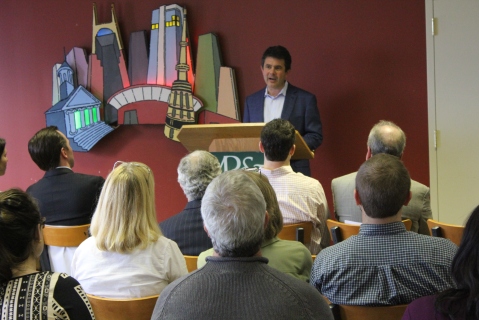
Author David Goldhill speaks at the MP&F Speaker Series event, hosted with the Columbia University Club of Nashville.
- David has written a book about the U.S. health care system, inspired, sadly, by the death of his father due to an infection he picked up in the hospital unrelated to what had brought him there in the first place. He visited Nashville as part of the MP&F Speaker Series on Monday night.
- The first thing I noticed about David’s book was its size – it’s a hardcover book, but it measures just 7.5 inches by 5 inches, much smaller than the typical hardcover. I asked David why he had done that, and he said it was because he wanted the average person to feel that the book was accessible, something they could handle. A large book on a subject as seemingly complex as health care, he said, would turn off the very readers he’s targeting. I doubt David would have been invited to appear on The Colbert Report if his book was perceived as a wonkish, policy-heavy slog. Paying as much attention to the packaging of his important message as the message itself was a brilliant decision.
Sen. George Mitchell

Sen. George Mitchell
- Mitchell was in town to speak to Vanderbilt students Monday night at the university’s annual Impact Symposium. The man’s list of credentials and achievements is extraordinary, and varied: Senate majority leader, peace negotiator in Northern Ireland, the Middle East and the Balkans, leader of Major League Baseball’s steroid investigation, etc.
- All that said, the things that stood out to me the most about Mitchell were his disarming self-awareness, his modesty and his sense of humor.
- It was clear that Mitchell did not want the enormous gap between his stature and place in life and that of his student audience to have any sort of chilling effect on the students, to undermine his ability to effectively communicate with his audience and stifle conversation.
- So, while he talked about brokering peace in Northern Ireland, and encounters with presidents and dealings with Yasser Arafat, he also told stories about his modest upbringing, about working as a janitor as a kid, about how he felt inferior to his more athletically talented brothers. He told the audience that his wife had once reminded him that he had entered into one particular peace negotiation with zero expectations – and had met them!
- Above all, Mitchell came across as a real human being. I have no doubt that his audience was influenced to buy into his more important messages on controversial topics simply because he was funny, likeable and real. No doubt this approach to communication is a big reason why he was such a popular figure on both sides of the political aisle during his time in the Senate.
Coach James Franklin
- In his first two years as Vanderbilt football coach, James Franklin has accomplished things that have either never been done at Vanderbilt, or were last achieved back in the era of leather helmets. Back-to-back bowl games, a nine-win season, five SEC victories last year, a top-20 recruiting class, etc.
- Speaking to a group of freshman students last night, Franklin talked about all the important behind-the-scenes steps that had to take place in order to change the culture and perception of the football program, and to get his own players to believe they could achieve success.
- A lot of this, he said, came down to messaging: relentless, positive, consistent messages delivered by anyone and everyone who came into contact with his players. He knew he had turned a corner when his players – whether in interviews with the media or in conversations with teammates or coaches – were repeating those same messages about winning, hard work and attention to detail.
- Two other things about Franklin’s remarks stood out to me.
- One initially sounded a bit counterintuitive. He said leaders sometimes focus too much on goals. What’s more important, he believes, is process. In his first year at Vanderbilt, his team won six games, a pretty big achievement at the time for Commodore football. What if, he said, he had set a goal for the team to improve to seven wins the next season? Or even eight? The goals would have actually imposed a restriction on his team, a satisfaction that would have arrived too early. Vanderbilt ended up winning nine games. What was more important than setting a goal was to focus on the little things, the everyday processes that add up to success. The average play in a football game lasts just six seconds. He asks his players to be excellent for six seconds. Then another six seconds, and another.
- The other thing that impressed me was the enthusiasm and seriousness with which Franklin approached his opportunity to speak with the freshmen. He had just walked off the field from a spring practice session. These weren’t wealthy donors, potential recruits, important members of the university administration or faculty – they were “just” freshmen taking a class on Sports and Society. But Franklin prepared a special PowerPoint presentation just for them. He spoke and took questions for nearly two hours. He was emotional, motivating. He even took the opportunity to do a little coaching, telling one kid whose cellphone kept ringing to always remember, for the rest of his life, to set his phone to vibrate. Franklin said he tells his players to do backflips out of bed each morning, to embrace life with enthusiasm and to be excellent at every single thing they do. Franklin could have given less than his best when speaking to some freshmen. But he approached the task as if his audience was the most important in the world, and I don’t think there’s any doubt those kids will now be raving fans.
Follow Andrew Maraniss @trublu24
Follow James Franklin @jamesfranklinvu
Follow David Goldhill @david_goldhill
MP&F’s Top 25 PR Questions
March 11, 2013
McNeely Pigott & Fox celebrated 25 years in business during 2012, and one of the ways we continue to celebrate is by answering the 25 questions we are most often asked about our business.
Question 21: Why is video important for public relations?
March forth on National Grammar Day
March 4, 2013
In celebration of National Grammar Day, we propose that everyone take a minute to be thankful for those who care deeply about using the English language properly and have little patience for those who don’t.
Raise a glass to your editors and proofreaders and all the English teachers who tried to get you to understand what a verb phrase is and why it matters where that comma goes.
So why does grammar matter? Simply put, language is a tool that humans have invented to convey our thoughts to others in a clear way. As with all tools, over time we come up with new and better ways to shape them for our use. But, when there is one standard tool that we all know how to use, we all understand one another better. Enter: grammar. Correct grammar is the ideal, the standard, the bar. It’s what makes sure we’re using our language tool in a way that the most people, all across the country, will understand.
We asked MP&F proofreader extraordinaire Diane Hogg and editorial director Roger Shirley for their short list of the worst grammar mistakes, and why they matter:
- Double negatives and verb disagreements: “He don’t know nothing.” OK. We know that certain verbs match certain nouns. And that “He do not …” isn’t quite right. We should say “He does not …” So let’s change that to “He doesn’t know nothing.” But, wait a sec. Since two negatives equal a positive, are we saying this guy does know something? It’s just so confusing. Using standard English to convey that thought would have kept us from saying just the opposite of what we meant.
- Misplaced (or missing) commas: “Let’s eat Grandma.” Whoa! Are we cannibals? If we all know the punctuation rule of setting off our addressee with a comma, we can ensure that Grandma knows we’re inviting her to sit with us at the table, not to be the main course. The comma in “Let’s eat, Grandma.” keeps our sweet grandmother from suffering unnecessary panic.
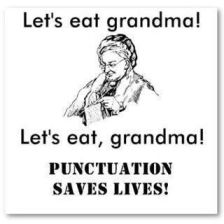
- Misused pronouns: “Me and her moved to the city.” The easy trick to use to make sure you’re using the right pronouns is to use each one separately: “Me moved to the city. Her moved to the city.” Suddenly, it’s glaringly obvious. And, of course, you should always come after the other person. One of the more rampantly misused pronouns is “myself.” This pronoun is always the object of a verb or preposition when the speaker or writer is the subject of the clause. Correct: “I did it myself.” Incorrect: “Bill and myself went down thar to the crik to do some fishin’.” Yep, that’s what you sound like when you use it that way.
- Dangling modifiers: This is one of the easiest mistakes to make and one of the easiest to avoid: Incorrect: “After standing in line for two hours, the ticket agent told us the show was sold out.” Correct: “After standing in line for two hours, we were told the show was sold out.” Just ask yourself who was standing in line. It certainly wasn’t the ticket agent.
- Its, It’s: Make yourself say “it is” every time you write “it’s.” If that isn’t right, then it is “its.”
